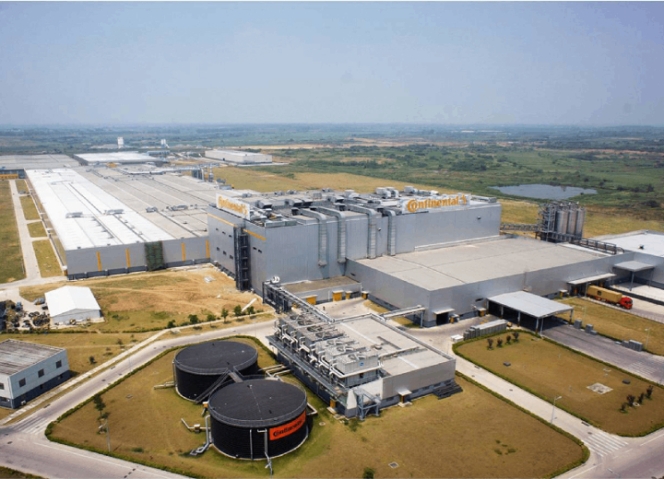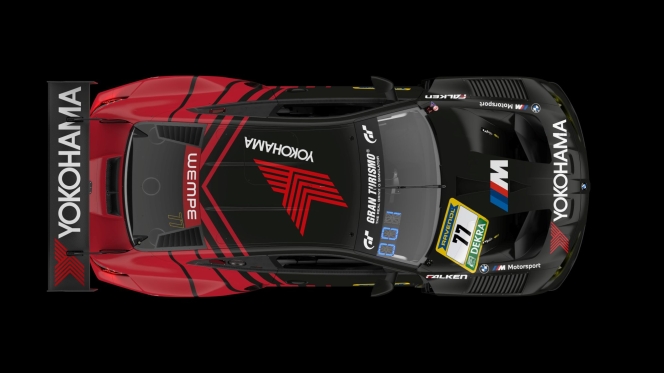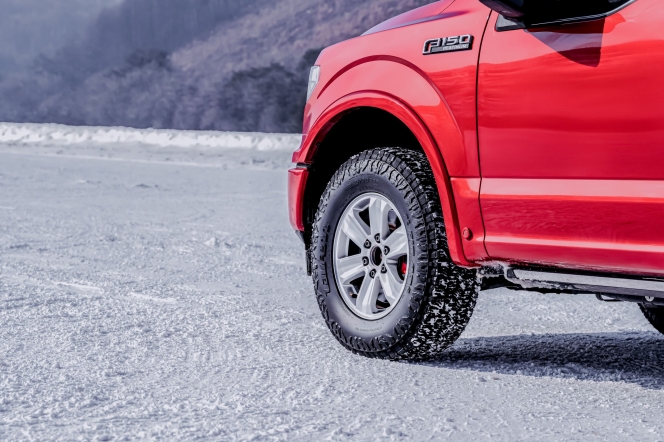- Continental
- Sustainability
- tyre
- International Sustainability and Carbon Certification
- ISCC PLUS
- UltraContact NXT
- Xiaoji Wang
- Jorge Almeida
Continental’s Hefei tyre plant bags ISCC Plus sustainability certification
- By TT News
- June 04, 2024

The Continental tyre plant in Hefei, China, has recently become the company’s latest production site to receive the International Sustainability and Carbon Certification (ISCC) PLUS sustainability certification.
The globally recognised standard certifies that Continental meets specific sustainability standards. It also confirms the transparency of the traceability of the raw materials used in the production process. Certification of the raw materials enables Continental to ensure the end-to-end traceability of the materials from sustainable sources. For the premium tyre manufacturer, this is a further step on the way to 100 percent sustainable materials in its products by 2050 at the latest.
Jorge Almeida, Head of Sustainability Tires at Continental said, "We are increasing the proportion of renewable and recyclable materials in our tyres. We use the principle of mass balance to enable sustainable materials and technologies to ramp-up, while generating the needed transparency and accountability regarding our progress. This is confirmed by the internationally recognised ISCC PLUS certification. Our aim is to gradually roll out the mass-balance approach to all our tyre plants worldwide."
The company says the certification was based on fulfilling and documenting certain raw material mass balancing procedures. The mass-balance approach mixes fossil, renewable and recycled raw materials in existing systems and processes. The quantities used are tracked along the entire value chain and can therefore be allocated proportionately at any time. The mass-balance approach enables Continental to gradually increase the proportion of sustainable materials in its products. It ensures that the balance of certified sustainable materials can be accurately reported.
Xiaoji Wang, Head of Continental tyre plant in Hefei, China said, "The certification proves the high quality of all of our work processes, from the procurement of certified raw materials to the transportation of the finished tyre. Our Hefei plant meets the strict certification requirements of ISCC PLUS, including raw material traceability and compliance with environmental standards. This certification underlines our commitment to sustainable processes along the entire value chain."
Complete traceability
ISCC PLUS is an internationally recognised voluntary certification system. It is applicable to the bioeconomy and circular economy and certifies non-conventional raw materials that can be used, for example, in the areas of foodstuffs, animal feed, chemicals, plastics, packaging and textiles. The various criteria required for ISCC PLUS certification include the traceability of raw materials, compliance with environmental standards, the protection of ecosystems, ensuring compliance with labour and human rights and the promotion of sustainable economic development.
The UltraContact NXT the most sustainable serial tyre from Continental, uses mass-balance-certified materials. For example, synthetic rubber made from bio-based and bio-circular raw materials or carbon black, which is produced in part using oil from circular processes. It is manufactured at the tyre plant in Lousado.
Continental says it is working intensively to switch as many raw materials as possible in production to sustainable materials. Raw materials that could be used in tyre production in the future include agricultural waste such as the ash from rice husks, rubber from dandelions, recycled rubber or PET bottles.
The certification of the Continental plants in Hefei, China, and Lousado, Portugal, is an important milestone in Continental’s efforts to use more than 40 percent renewable and recycled materials in its tyres by 2030 and to become completely climate-neutral by 2050. By 2050 at the latest, all new tyres from Continental are to be made entirely from sustainable materials.
Continental’s Hefei tyre plant, located in the Nangang Tech Park of Hefei’s High-Tech Zone, was inaugurated in September 2009 and today covers a total area of 667,000 square meters. The company has been producing tyres for passenger cars and light commercial vehicles for the Chinese market and other markets in the Asia-Pacific region since 2011. The plant has also been producing two-wheel tyres since 2012.
Michelin Becomes Official Partner Of Rocket League Championship Series 2026
- By TT News
- March 03, 2026

Michelin has announced a strategic collaboration with BLAST, the organiser behind the 2026 Rocket League Championship Series (RLCS), which serves as the premier global tournament for the popular video game Rocket League. Through this agreement, Michelin becomes an official partner of one of the most energetic and widely viewed eSports properties on the international stage.
Rocket League itself enjoys immense global popularity, attracting several million active participants on a monthly basis. The RLCS season consistently draws tens of millions of views across the world, underscoring its significant reach. This move allows Michelin to deepen its involvement in the competitive gaming sector by associating with a high-profile series known for its passionate following.
The game’s core dynamic involves vehicles competing in a fast-paced arena where precision, control and rapid execution are paramount. These very attributes closely align with Michelin’s established heritage in mobility solutions and high-performance engineering, particularly its extensive background in motorsport. The partnership therefore represents a natural extension of the brand’s core principles into a digital environment.
By entering the world of the RLCS, Michelin seeks to enhance its connection with younger demographics and solidify its relevance within the digital spaces that are increasingly defining future trends and cultural habits. This initiative builds on a foundation of over 25 years during which Michelin has cultivated partnerships within the gaming and automotive simulation spheres, consistently applying its technological know-how to support both realism and superior performance in virtual driving experiences.
- Yokohama Rubber
- Yokohama ADVAN Tyres
- Nürburgring 24-Hour Race
- Nürburgring Langstrecken-Serie
- BMW M Motorsport
Yokohama Becomes BMW M Motorsport’s Official Tyre Partner For 2026 Nürburgring Events
- By TT News
- March 03, 2026

The Yokohama Rubber Co., Ltd., has entered into a new agreement to serve as the official tyre supplier for BMW M Motorsport, the division responsible for the brand's global racing endeavours. This collaboration will debut at the prestigious Nürburgring 24-Hour Race and throughout the Nürburgring Langstrecken-Serie in 2026.
This renewed partnership revives a historical connection between the two companies, who previously worked together on the same iconic circuit from 1980 to 1990. During that initial decade-long stint, their combined efforts secured two overall victories. After an interval of nearly four decades, they are reuniting for the current season to compete in the premier SP9 class, fielding the BMW M4 GT3 EVO. For this campaign, Yokohama will equip the vehicle with its high-performance ADVAN racing tyres, with the shared objective of capturing another overall win.

Beyond its tie-up with the BMW team, Yokohama Rubber continues its longstanding commitment to the Nürburgring. It will provide its tyres to numerous leading teams contesting both the endurance series and the 24-hour event this season. The company is focused on achieving an overall championship victory for a vehicle equipped with its YOKOHAMA brand tyres.
Franciscus Van Meel, CEO, BMW M GmbH, said, “We are excited to welcome YOKOHAMA as Official Partner of BMW M Motorsport for our Nürburgring programme. YOKOHAMA’s technical expertise and motorsport passion strengthen our drive for maximum performance and precision. Their support allows our team to focus fully on what defines BMW M Motorsport: pushing the limits on every lap. We look forward to a strong endurance season.”
Team: Schubert Motorsport
Class: SP9
Car: BMW M4 GT3 EVO
Tyres:
ADVAN A005 (for dry conditions); Sizes: front 300/680R18, rear 330/710R18
ADVAN A006 (for wet conditions); Sizes: front 300/680R18, rear 320/710R18
Race Schedule (as of date of this release)
March 14 (Sat): NLS Round 1
March 21 (Sat): NLS Round 2
April 11 (Sat): NLS Round 3
April 18 (Sat) –19 (Sun): Nürburgring 24-Hour Race (Qualifiers) , NLS Rounds 4 & 5
May 14 (Thu) –17 (Sun): Nürburgring 24-Hour Race
June 20 (Sat): NLS Round 6
August 1 (Sat): NLS Round 7
September 12 (Sat) –13 (Sun): NLS Rounds 8 & 9
October 10 (Sat): NLS Round 10
Second-Generation Laufenn X FIT AT2 All-Terrain Tyre Launched In US
- By TT News
- March 03, 2026

Hankook Tire has introduced the Laufenn X FIT AT2, a new addition to its all-terrain tyre lineup aimed at drivers who require durability and adaptability without compromising on everyday driving comfort. Positioned as an affordable option, this tyre is engineered to handle a mix of on-road and off-road conditions while delivering long-lasting value.
Building upon the foundation of its predecessor, the X FIT AT2 brings several performance upgrades. It features enhanced traction across varied landscapes, a 15 percent improvement in tread longevity and reliable handling in different weather conditions. The tyre is designed to fit a broad spectrum of light trucks and SUVs, with availability ranging from 15 to 22 inches to accommodate popular vehicle models in the market.
This launch reflects Laufenn’s ongoing strategy to diversify its offerings as it strengthens its presence in over 100 countries. Since its introduction in Europe, the brand has consistently expanded its range for both passenger vehicles and commercial applications, responding to shifting consumer needs. The X FIT AT2 reinforces this direction by providing a balance of rugged capability and composed road manners for those who frequently transition between highways and rougher terrain.
Engineered for resilience, the tyre incorporates a reinforced structure, including select sizes with three-ply sidewalls to resist cuts and impacts. Its tread design features directional and lateral grooves that enhance water dispersion and grip on slippery or loose surfaces. Additional protective elements such as offset shoulder blocks and rim guards help shield against debris and curb damage. A two-step deep sipe pattern promotes uniform wear, contributing to extended usability.
Certified with the Three-Peak Mountain Snowflake symbol, the X FIT AT2 offers dependable performance in dry, wet and snowy winter conditions. It comes with warranty coverage tailored to its sizing, offering 60,000 miles for P-metric versions and 50,000 miles for LT-metric options. With this release, Laufenn continues to round out its portfolio alongside existing lines such as the S FIT, G FIT and I FIT series.
KC Jensen, Vice President – U.S. Passenger Car and Light Truck Sales, Hankook Tire America Corp, said, “The X FIT AT2 represents the next step forward for the Laufenn brand as we continue to deliver practical, dependable solutions for everyday drivers who also want the freedom to explore off-road. Building on the success of the original X FIT AT, this second-generation tyre offers a stronger blend of durability, versatility and everyday comfort at an accessible value.”
Comerio Ercole To Showcase Calendering And Digital Solutions At Two Premier 2026 Trade Fairs
- By TT News
- March 03, 2026

Comerio Ercole is set to make a significant impact on the global stage in 2026 with its participation in two major industry exhibitions. The company will showcase its latest advancements at both Chinaplas 2026 and Tire Technology Expo 2026, highlighting a comprehensive portfolio designed to enhance precision, productivity and sustainability in polymer processing.
At Tire Technology Expo, Comerio Ercole will present integrated systems tailored for the tyre industry, focusing on high-performance rubber calendering and digital intelligence. A flagship solution is the TRIPLE 4-roll calendering unit. Its innovative "S" configuration provides remarkable flexibility by enabling the processing of both textile and steel cord, as well as the production of rubber sheeting, all within a single line. The system’s capability for simultaneous lamination ensures high precision and product stability while minimising defects. Downtime is a critical factor in tyre production, and the patented FASTEEL system directly addresses this. By automating the steel cord change process, it dramatically reduces changeover time from hours to minutes, allowing the line to continue running during preparation and thereby maximising plant availability and operator safety. Following the calendering process, the SUPERCUT system guarantees clean, precise transversal cuts for both steel and textile-reinforced rubber, integrating guillotine and high-speed rotary blades to minimise waste and streamline downstream winding.
Simultaneously, at Chinaplas 2026, taking place in Hall 2.1 at Stand C85, the company will place a strong emphasis on its patented HYDROPLUS concept for PVC and plastic calendering. This technology suite is engineered to deliver micrometric precision and robust process stability through advanced hydraulic controls. Central to this is HYDROGAP, a system that achieves exceptional thickness uniformity with high-resolution gap positioning. Complementing this are HYDROSAFE, which ensures rapid roll separation for ultimate protection, and HYDROTHERM, a feature that intelligently compensates for thermal expansion to maintain precise gap settings during fluctuating operational temperatures.
Beyond mechanical innovation, the company is driving digital transformation with its CELEMETRY and MINERV-AI platforms. CELEMETRY focuses on sustainability by converting production data into actionable insights for environmental reporting and energy optimisation. MINERV-AI captures and standardises operational expertise through artificial intelligence, supporting more effective maintenance protocols, training procedures and overall operational consistency. Through these combined efforts at both exhibitions, Comerio Ercole is demonstrating a holistic approach to advancing the plastics, rubber and tyre industries.







Comments (0)
ADD COMMENT